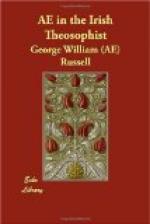“I am going doctoring,” she said. “Old nurse Winder is ill, and my father will not be back until late.” Mr. Rayne was the country doctor.
“May I go with you?” he asked.
“Oh, yes, why not? But I have first to call at two or three places on the way.”
He went with her. He was full of wonder at her. How could she come out of her own world of aspiration and mystic religion and show such perfect familiarity, ease and interest in dealing with these sordid village complaints, moral and physical? Harvey was a man who disliked things like these which did not touch his sense of beauty. He could not speak to these people as she did: he could not sympathize with them. The pain of the old woman made him shrink into himself almost with more disgust than pity. While Olive was bending over her tenderly and compassionately, he tried to imagine what it was inspired such actions and such self-forgetfulness. Almost it seemed for a moment to him as if some hidden will in the universe would not let beauty rest in its own sphere, but bowed it down among sorrows continually. He felt a feeling of relief as they came out agin into the night.
It was a night of miracle and wonder. Withdrawn far aloft into fairy altitudes, the stars danced with a gaiety which was more tremendous and solemn than any repose. The night was wrought out of a profusion of delicate fires. The grass, trees, and fields glowed with the dusky colours of rich pottery. Everywhere silence; everywhere the exultant breathing of life, subtle, universal, penetrating. Into the charmed heart fell the enchantment we call ancient, though the days have no fellows, nor will ever have any. Harvey, filled up with this wonder, turned to his companion.
“See how the Magician of the Beautiful blows with his mystic breath upon the world! How tremulous the lights are; what still ness! How it banishes the memory of pain!”
“Can you forget pain so easily? I hardly noticed the night—it is wonderful indeed. But the anguish it covers and enfolds everywhere I cannot forget.”
“I could not bear to think of pain at any time, still less while these miracles are over and around us. You seem to me almost to seek pain like a lover. I cannot understand you. How can you bear the ugly, the mean, the sordid—the anguish which you meet. You— so beautiful?”
“Can you not understand?” she said, almost impetuously. “Have you never felt pity as universal as the light that floods the world? To me a pity seems to come dropping, dropping, dropping from that old sky, upon the earth and its anguish. God is not indifferent. Love eternal encircles us. Its wishes are for our redemption. Its movements are like the ripples starting from the rim of a pond that overcome the outgoing ripples and restore all to peace.
“But what is pain if there is this love?” asked Harvey.
“Ah, how can I answer you? Yet I think it is the triumph of love pushing back sin and rebellion. The cry of this old nature being overcome is pain. And this is universal, and goes on everywhere, through we cannot comprehend it; and so, when we yield to this divine love, and accept the change, we find in pain a secret sweetness. It is the first thrill that heralds an immense dawn.”




